Remember a couple of years ago when members of the Democratic Party stated that 5 Billion dollars was way too much for a wall to protect our Southern Border? We worked on the Budget this week and it was literally over 40 Billion dollars just for the state of Missouri and the Dems stated that still wasn’t enough. Fortunately, we put back almost 2 Billion dollars for future budgets as inflation will continue to rise and most likely we will be in a Recession within the next two years. Below are some of the measures that will be funded with those monies. I am happy to say that Broadband in rural areas will be benefited greatly with these funds and will hopefully be implemented soon.
House Approves Fiscally Responsible State Operating Budget (HBs 3001-3013, 3015, 3020)
The members of the Missouri House of Representatives have given their stamp of approval to a $46.5 billion state operating budget. The state spending plan, which received support from both sides of the aisle, makes a record investment in the state’s system of education while also allocating funds to help the state’s most vulnerable citizens, pay for road improvements and repairs, invest in water and broadband infrastructure, and bolster the state’s reserve fund.
By approving the spending plan for the upcoming fiscal year, lawmakers provided full funding for the state’s K-12 foundation formula. In total, House members approved nearly $10.1 billion in funding for K-12 education, which represents an increase of more than $2.6 billion in funding when compared to the previous budget. That increase is fueled primarily by an additional $2.4 billion in federal funding. The plan also works to improve teacher pay by allocating approximately $37.4 million to revive the Career Ladder program. Additionally, the House plan invests $75 million in Close the Gap grants that will help Missouri families address the learning loss that occurred as a result of the pandemic.
House members also boosted funding for the state’s institutions of higher learning. The higher education funding plan is increased by nearly $55 million when compared to the previous budget. That increase includes nearly $43 million in new funding for the state’s four-year institutions, and more than $8 million in new spending for the state’s community colleges. The House budget also works to make college more affordable for Missouri students by increasing funding for the A+ Scholarship Program by $6 million and the Access Missouri Scholarship Program by $9 million, which fully funds the program for the first time. The budget plan also includes an additional $3.5 million for the Bright Flight Scholarship program, which fully funds the program to provide full scholarships to the top 5 percent of test takers.
The budget approved by the House also makes a strong investment in the state’s transportation infrastructure. The spending plan allocates nearly $248 million in new funding from the State Road Fund, which is used for maintenance and construction for roads and bridges. That plan includes $100 million for rural roads around the state that have fallen into disrepair. Additionally, the plan allocates $75 million in federal funds for the Transportation Cost-Share Program that partners with local municipalities to fund road repairs. The state’s Amtrak service also receives funding that will allow it to resume twice-daily rail service across the state.
The House-approved spending plan also provides substantive increases to many of the programs that serves the state’s most vulnerable citizens. The budget provides for nearly $300 million for rate increases for home and community-based service providers. It also provides more than $26 million in new funding for the state’s Area Agencies on Aging (AAAs), and an additional $15.1 million for the AAAs to expand meal production capacity. The House budget also increases funding for the Veterans Health and Care Fund by more than $6 million to help further support the state’s veterans’ homes. Other funding increases include $20 million for the Children’s Trust Fund for grant programs that will assist children who are victims of sexual abuse and neglect, $2.2 million for Alternatives to Abortion, and $5.8 million for autism diagnostic centers.
While the budget approved by the House provides record funding in a number of areas, the plan also represents a reduction in spending of approximately $1.1 billion when compared to the plan recommended by the governor. The House Budget Chairman chose to scale back some of the spending increases proposed by the governor in order to ensure the state has a healthy bottom line. The House budget plan leaves more than $1.8 billion in general revenue unspent.
The vice chairman of the House Budget Committee said the budget approved by the House “will be billions more than the budget before it, and there’s only so much money you can spend responsibly within a given fiscal year, and I think we’ve struck that balance.”
One House member who supported the plan said the state legislature should not be like Washington, D.C. by throwing cash at every program. He said, “The same folks who are on the floor right now telling us we need to spend every dime that we have access to right now will be the same folks who, when we hit a downturn, will tell us we’ve mismanaged these dollars. Passing a conservative budget right now is incredibly important.” He added, “We need to make sure that we’re being responsible with the dollars we have access to, the billions we have access to today.”
The chairman of the House Budget Committee told his colleagues, “This budget, while it is the state’s largest in history, uses a lot of the federal money we’ve been sent to prioritize things like education and various infrastructures like water infrastructure and broadband infrastructure. We’ve spent a long time trying to plan and make sure that money is invested as wisely as it can be.”
The budget bills approved by the House now move to the Senate for consideration. The two chambers have until Friday, May 6 to come to a final agreement on the state operating budget.
Some of the items of note in the budget include:
- Full funding for the K-12 School Foundation Formula
- $1.96 billion in Elementary and Secondary School Emergency Relief (ESSER) III funds, as well as $443 million in ESSER II funds, for K-12 education
- $37.4 million to bring back the Teacher Career Ladder program
- $75 million for Close the Gap grants, which would provide funds to Missouri families to address learning loss
- 5.4% core increases for funding for Missouri’s institutions of higher learning
- $6 million increase for the A+ Scholarship Program
- $9 million increase to fully fund the Access Missouri Scholarship Program
- $3.5 million increase to fully fund the Bright Flight Scholarship Program
- $31.5 million in new funding for the MO Excels Workforce Initiative, which facilitates development and expansion of employer-driven education and training programs
- $4 million for a statewide math supplement
- $248 million allocated from the State Road Fund for construction and maintenance
- $100 million for repair of rural, low-volume routes
- $75 million in federal funding for the Transportation Cost-Share Program
- $10.3 million in new federal funding for the Low Income Weatherization Assistance Program
- $1 million for the Energize Missouri Small Agricultural Grant
- $42.2 million in federal funds for the Rural Broadband Grant Program
- $15.9 million for Missouri One Start, which helps businesses recruit, onboard, and train job applicants during expansions
- $9.9 million in federal funds to the Division of Employment Security for fraud detection and prevention
- $7 million for grants to drug task forces
- More than $42 million for next generation 911 functionality
- $24.4 million to the Department of Corrections for health and mental health care
- $299 million for rate increases for home and community-based service providers
- $26.2 million in new federal funding for the state’s Area Agencies on Aging
- $15.1 million in funding for the Area Agencies on Aging to expand meal production capacity
- $6.2 million for the Missouri Veterans Health and Care Fund to increase funding for the state’s veterans’ homes
- $12 million for the Opioid Addiction Treatment and Recovery Fund
- $5.8 million for autism diagnostic centers
- Nearly $3 billion in new funding for the state’s Medicaid program, which helps cover the cost of Medicaid expansion
- $215.6 million in funding for new nursing home provider rates, which includes value-based payments to ensure the state is getting good results for the dollars invested
- $93.5 million in federal stimulus funds for the Low-Income Home Energy Assistance Program
- $46 million for the Family First Prevention Services Act, which helps families safely keep their children at home
- $2.2 million in increased funding for the Alternatives to Abortion program
- $20 million for the Children’s Trust Fund for new programs that will assist children who are victims of sexual abuse and neglect
- $410.7 million for water infrastructure grants
- $104.7 million for a new crime lab for the Missouri State Highway Patrol
- $88 million for a new training academy for the Missouri State Highway Patrol
- $104.5 million for the University of Missouri NextGen Precision Health Building
- $100 million for the State Emergency Management Agency for statewide response to COVID-19
- $250 million for the broadband infrastructure program
As always please feel free to contact our office with any questions, comments or concerns. God bless you.
Travis Smith
State Representative, District 155
201 W. Capitol Avenue, Room 110A
Jefferson City, MO 65101
573-751-2042






